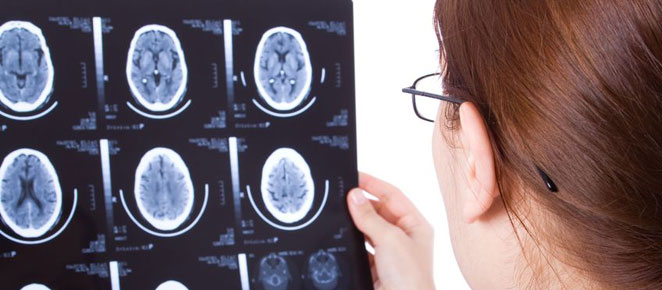The information contained in this article is not meant to serve as a medical diagnosis or advice, especially when it comes to treatment. If you have questions about a medical condition it is important for you to see your physician or another qualified health professional. Do not ignore the advice of a medical professional or delay seeking treatment because of what you’ve read in this article or somewhere else online.
The media has been giving concussions a lot of attention lately since the NFL has been forced to acknowledge the burgeoning evidence that concussions can cause victims lasting damage. Medical research has very clearly shown that concussions, especially when suffered repeatedly, cause long-term brain damage that includes memory problems, difficulty focusing and other cognitive impairments.

Diagnosing a Concussion
If you’ve received a head injury your physician will go over your medical history, assess your symptoms, and give you a neurological examination. You could very well be suffering from a concussion and not show any signs or symptoms until hours or even days after being injured.
Your doctor will most likely perform or provide a referral for the following tests:
Neurological Assessment
Your doctor will first ask you some very detailed questions about how you were injured before performing a neurological examination or assessment. He or she will check your:
- Balance
- Hearing
- Physical coordination
- Reflexes
- Strength and sensation
- Vision
Cognitive Evaluation
There are a number of tests your doctor will likely give you to evaluate your cognitive (thinking) abilities. These would include your:
- Ability to recall facts and information
- Ability to focus and concentrate
- Your memory
Brain Imaging Tests
If you are suffering from seizures, debilitating headaches, constant vomiting or have worsening symptoms, you may need brain imaging. These tests should be able to determine how severe your injury is and whether you have swelling and/or bleeding inside your skull.
The test that’s normally used to evaluate the brain immediately after being injured is called a cranial computerized tomography (CT) scan. A CT scan takes a series of cross-sectional X-ray images of the injured skull and brain.
Another test called a magnetic resonance imaging (MRI) is often used to pin point any changes that may have occurred in the brain and/or to diagnose problems that can happen after suffering a concussion. To get such detailed images of the brain an MRI employs radio waves combined with powerful magnets.

24-hour Observation
After suffering a concussion you should either be hospitalized overnight or observed at home very closely for 24 hours straight with your doctor’s permission.
Someone needs to be constantly checking on you for 24 hours straight to determine whether you’re stable or if your symptoms might be getting worse.
During this time, your caregiver should wake you up on a regular basis to ensure that you are able to wake up normally.
Recommended Treatment
If you have a concussion, your recovery will move along more quickly if you can simply rest, both physically and mentally.
In order to do this you will need to avoid any kind of physical activity that exacerbates your symptoms. This would include activities that require you to physically exert yourself, like playing sports or doing anything involving vigorous movements. Avoid these types of activities until they no longer cause you any symptoms.
In terms of mental activities, avoid anything that requires you to exert yourself mentally, trying to concentrate or think things through. You should avoid schoolwork, using a computer, reading, watching TV, texting and/or playing video games if you notice your symptoms acting up or getting worse due to this mental activity.
If you’re a student your doctor will likely want you to shorten your school days and workloads. If you are employed your doctor will want you to work shorter days and take frequent breaks throughout the day while recovering from your concussion.
Once your symptoms start improving, you can add more mental activities, such as taking on more schoolwork or projects at work. You can also gradually increase the number of hours each day that you spend at school or work.
Before resuming any physical activity you will want to consult with your doctor. It may be that he or she will allow you to do some very light physical activity once your symptoms totally subside. These would be things like gentle jogging or exercising on a stationary bike for short periods of time. As long as these activities do not trigger or make your symptoms worse, they should be okay.
In time, after you are no longer experiencing any symptoms of a concussion, you can consult with your doctor as to what precautions you would need to take in order to stay safe playing sports. If you start playing sports too soon after suffering a concussion you increase your risk of another concussion and a serious and perhaps deadly brain injury.
For headaches, you can take an over-the-counter pain reliever like acetaminophen, the most common being Tylenol, but there are other brands as well. If you take aspirin or ibuprofen, which would be Motrin IB, Advil and others, you risk an increase in bleeding.

Getting Ready for Your Doctor’s Appointment
It is vital that a medical doctor examine anyone with a head injury of any kind, even if it doesn’t seem like an emergency.
If it’s your child who has suffered a head injury, get on the phone right a way to call his or her pediatrician. The doctor may ask you to bring your child in immediately, depending on the seriousness of your child’s symptoms.
How to prepare for the doctor’s appointment:
What to Do
- Find out if there are any instructions you need to follow or restrictions prior to seeing the doctor. In the meantime, avoid any physical or mental activities that exacerbate your symptoms. Do not participate in any physical activities including sports. Avoid as much as possible any stressful, prolonged or difficult mental activities.
While making your doctor’s appointment, find out what you or your child can do to assist in the recovery and avoid reinjury. Athletes should not resume playing their sport until they have undergone a medical evaluation.
- Make a list of all signs and symptoms that you or your child has been suffering. This should include when each symptom started and how severe each one is.
- List any other medical issues that you or your child is receiving treatment for. Include any previous head injuries. List all prescriptions and over-the-counter medications as well as vitamins, minerals and any other supplement you or your child takes.
- Bring someone along with you to the doctor’s. Since you have a head injury it may be difficult for you to take in all the medical information and advice. If you bring someone along they may remember things that you may end up forgetting.
Questions For Your Doctor
If you think you might have a concussion, you will want to ask the following questions:
- What exactly is a concussion?
- What tests will I need to have?
- Do I have a concussion?
- What approach to treatment do you think is best?
- When do you think my symptoms will begin subsiding?
- Am I now more at risk of having another concussion?
- What is my risk for having long-term effects or complications?
- When do you think it would be safe for me to start exercising again?
- When do you think it would be safe for me to play sports again?
- Would it be safe now for me to go back to school or return to work?
- Is it safe now for me to drive or run heavy equipment of any sort?
- I’m dealing with other medical conditions. Can they all be managed at once?
- Do I need to see a specialist? Will my health insurance cover a specialist and if not, what would it cost? You may need to check with your insurance company for these answers.
- Do you have any informational leaflets or brochures for me to take home? Are there any websites that you suggest for further information?
You may also have additional questions that occur to you during your appointment, so don’t be shy about asking all your questions.
The Doctor’s Questions for You
Be ready to answer the following questions from your doctor regarding the head injury and its symptoms:
- Do you participate in any contact sports?
- How did you injure your head?
- What symptoms did you notice having right after being injured?
- Do you recall exactly what occurred right before being injured? Right after?
- Were you knocked unconscious from the injury?
- Have you experienced any seizures?
- Have you felt nauseous or been vomiting since you were injured?
- Have you experienced any headaches? If so, when did they start?
- Are you having any problems now with physical coordination?
- How has your memory been since the injury? Any problems concentrating?
- Are you experiencing any unusual sensitivity, problems with your hearing and/or vision?
- Have you noticed any unusual mood swings, including agitation, anxiety or depression?
- Are you feeling more fatigued since being injured?
- Are you having difficulty getting to sleep, sleeping or waking up?
- Has your sense of smell or taste changed in any way?
- Have you been dizzy or experienced any vertigo?
- Are there any other symptoms that you’ve noticed that you are worried about?
- Is this your first head injury or have there been others in the past?
Taking Care of Yourself Until You See Your Doctor
The best thing you can do for now is to avoid doing anything that exacerbates your symptoms. This means you need to avoid participating in any physical activities, including sports, which will raise your heart rate. Taking long walks, jogging or doing anything physically strenuous, like lifting weights is out of the question.
Also, do not get involved in any mental activity that may exacerbate your symptoms, things that require a lot of concentration. For example, doing schoolwork, using the computer, playing video games, texting and/or watching TV.
If you’re suffering from headaches, you can take an over-the-counter pain reliever like acetaminophen, the most common one is Tylenol, but there are other brands. It is best to avoid taking aspirin or ibuprofen, which would be Motrin IB, Advil and others because these will put you at risk for an increase in bleeding.
Recovering Losses
If you or a loved one has suffered a concussion as the result of the negligence of another, contact O’Connor, Runckel & O’Malley and we will provide you with a free consultation with an experienced concussion attorney. At O’Connor, Runckel & O’Malley, we make sure you have the resources necessary for the evaluation and diagnosis of all types of head injuries, and we will help you recover your losses.
(Source: Mayo Clinic)
Published on behalf of O’Connor, Runckel & O’Malley LLP

